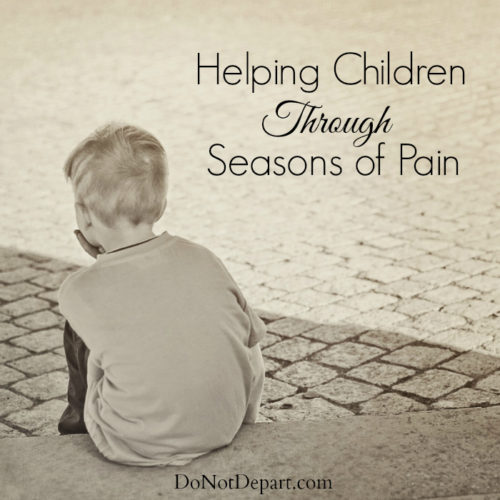
David set an important example when he cried out in anguish to God in the Psalms. He did not hesitate to passionately pour out his feelings, both joyful and painful.
I am feeble and crushed;
I groan because of the tumult of my heart.
O Lord, all my longing is before you;
my sighing is not hidden from you.
My heart throbs; my strength fails me,
and the light of my eyes—it also has gone from me.
Psalm 38:8-10
When your child is struggling, he needs the freedom to have the emotions he has. It is that simple. And he needs you more than ever at this time.
If his emotions overwhelm him and he lashes out, try not to take it personally. We often hurt the ones we love because they are safe. Stay available. Pray with your child and encourage him to tell God how he really feels.
…a time to weep, and a time to laugh;
a time to mourn, and a time to dance;
Ecclesiastes 3:4
Children need to know that it is okay to be sad, okay to grieve. Expect questions and expect them to be hard to answer. You are your child’s parent by God’s design, and He will give you the words if you ask Him to.
Don’t turn away from your child if it seems like he or she is questioning God’s sovereignty or even His very existence. We all go through times of wrestling with God on our own terms – in the midst of the circumstances of our lives and in the context of our individual gifts and challenges. It is no different for children.
“Come now, let us reason together, says the LORD” Isaiah 1:18a
God wants us to use our minds to understand Him and our situations. But He also asks us to trust Him and have faith. Both are equally important. Be willing to talk things through, yet encourage your child in this truth: God is faithful even in circumstances that make no sense to us.
Here are some simple suggestions for when your child is struggling:
Do:
- Pray that God shows you when to speak and when to be silent
- Be willing to just sit with your child
- Be flexible, recognizing that just like you, your child’s emotions are not on a timetable.
- Extend grace for misbehavior while keeping healthy boundaries
- Show your own pain, in an honest but not overwhelming way
- Be honest – it is okay to say “I don’t know”
- Share your hope in Jesus
- Read applicable scriptures together and discuss them
- Pray for and with your child daily
Don’t:
- Panic if your child has hard questions about God
- Shame your child for having doubts and fears
- Promise everything will be ok
- Try to make everything look alright when it isn’t
- Underestimate your child’s ability to understand complex theological concepts
You love your child more than anyone else does, but that love doesn’t begin to compare with God’s love for him. God cares even more than you do about your child’s pain.
Through him we have also obtained access by faith into this grace in which we stand, and we rejoice in hope of the glory of God. More than that, we rejoice in our sufferings, knowing that suffering produces endurance, and endurance produces character, and character produces hope, and hope does not put us to shame, because God’s love has been poured into our hearts through the Holy Spirit who has been given to us. Romans 5:2-5
Some of the hardest seasons of my life have borne the greatest fruit spiritually. I trust that this will be true for my children as well. God works through suffering to refine us and draw us closer to Him. As painful as it is to walk alongside my children when they struggle, I see God working, and have a hope borne not only from the promises in His Word, but also from personal experience.
Season of pain are part of the human condition, no matter our age. I pray that God will bless you with wisdom and His words when you face a season of suffering alongside your child. He is faithful.


Join the Discussion